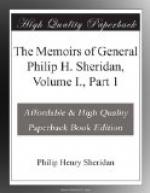After our removal to La Pendencia a similar pursuit of savages occurred, but with more fortunate results. Colonel John H. King, now on the retired list, then a captain in the First Infantry, came to our camp in pursuit of a marauding band of hostile Indians, and I was enabled to put him also on the trail. He soon overtook them, and killing two without loss to himself, the band dispersed like a flock of quail and left him nothing to follow. He returned to our camp shortly after, and the few friendly Indian scouts he had with him held a grand pow-wow and dance over the scalps of the fallen braves.
Around La Pendencia, as at La Pena, the country abounded in deer, antelope, wild turkeys, and quail, and we killed enough to supply abundantly the whole command with the meat portion of the ration. Some mornings Frankman and I would bring in as many as seven deer, and our hunting expeditions made me so familiar with the region between our camp and Fort Duncan, the headquarters of the regiment, that I was soon enabled to suggest a more direct route of communication than the circuitous one then traversed, and in a short time it was established.
Up to this time I had been on detached duty, but soon my own company was ordered into the field to occupy a position on Turkey Creek, about ten or twelve miles west of the Nueces River, on the road from San Antonio to Fort Duncan, and I was required to join the company. Here constant work and scouting were necessary, as our camp was specially located with reference to protecting from Indian raids the road running from San Antonio to Fort Duncan, and on to the interior of Mexico. In those days this road was the great line of travel, and Mexican caravans were frequently passing over it, to and fro, in such a disorganized condition as often to invite attack from marauding Comanches and Lipans. Our time, therefore, was incessantly occupied in scouting, but our labors were much lightened because they were directed with intelligence and justice by Captain McLean, whose agreeable manners and upright methods are still so impressed on my memory that to this day I look back upon my service with “D” Company of the First Infantry as among those events which I remember with most pleasure.
In this manner my first summer of active field duty passed rapidly away, and in the fall my company returned to Fort Duncan to go into winter quarters. These quarters, when constructed, consisted of “A” tents pitched under a shed improvised by the company. With only these accommodations I at first lived around as best I could until the command was quartered, and then, requesting a detail of wagons from the quartermaster, I went out some thirty miles to get poles to build a more comfortable habitation for myself. In a few days enough poles for the construction of a modest residence were secured and brought in, and then the building of my house began. First, the poles were cut the proper length, planted in a trench




